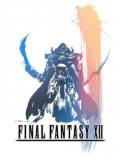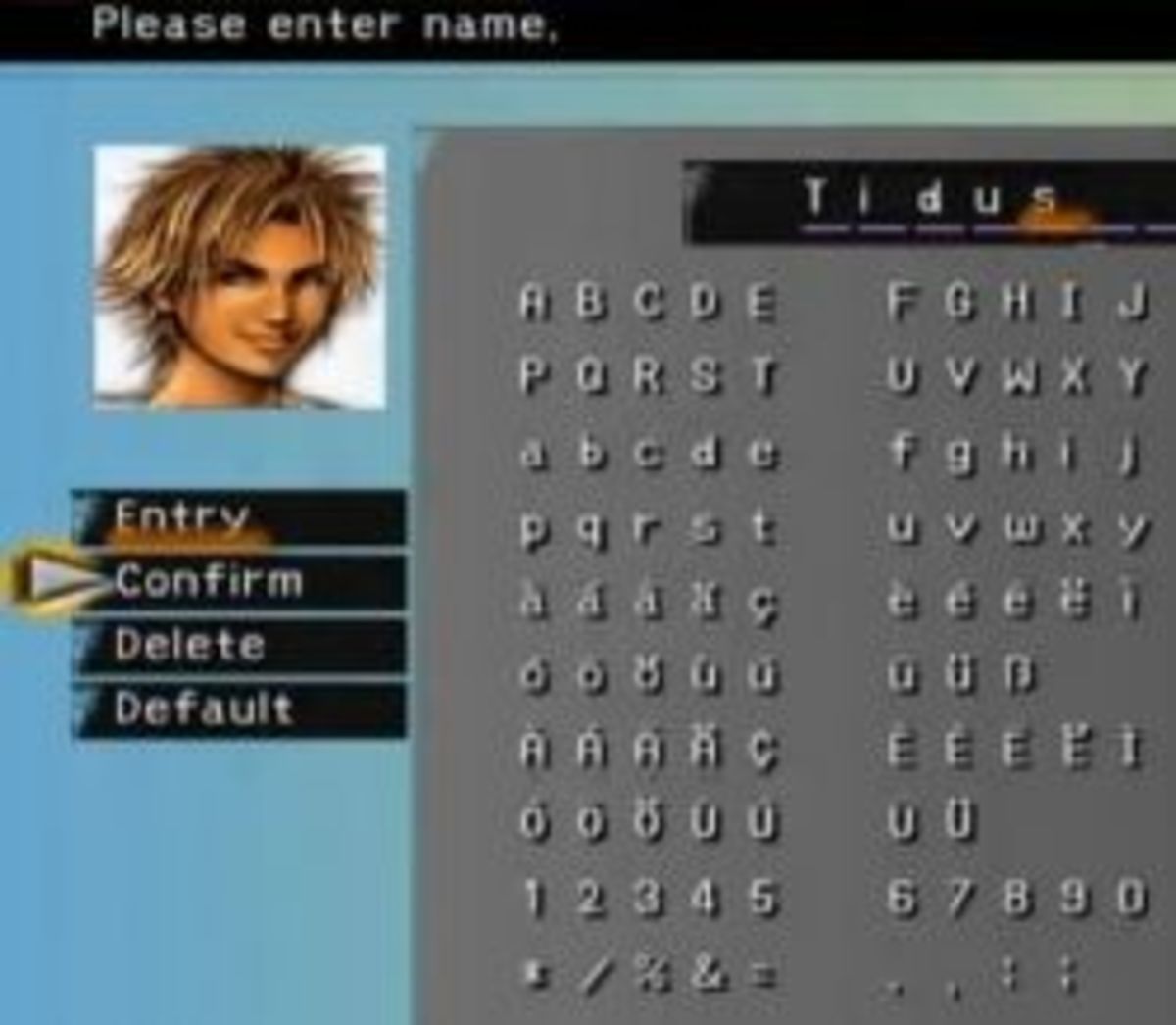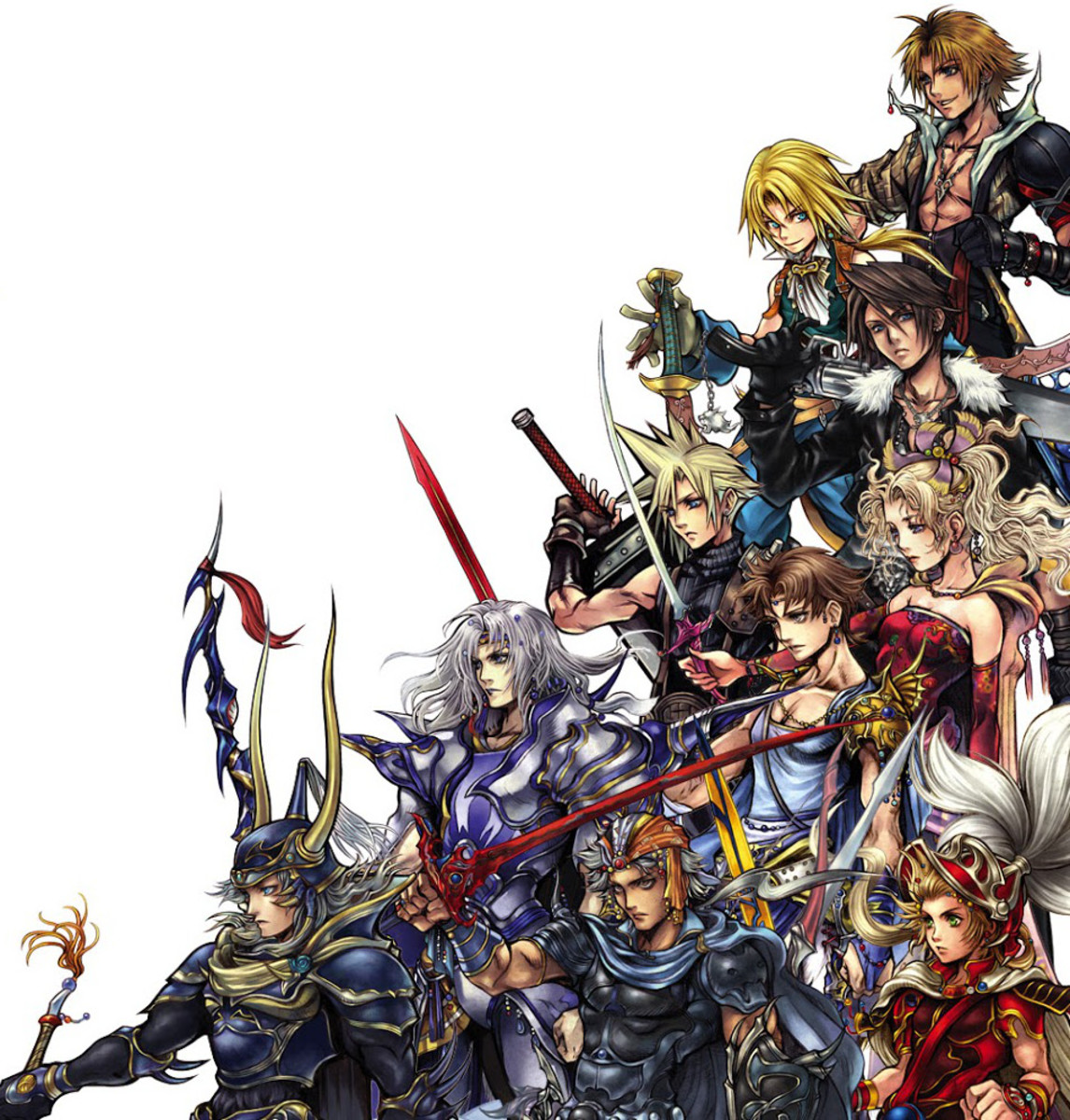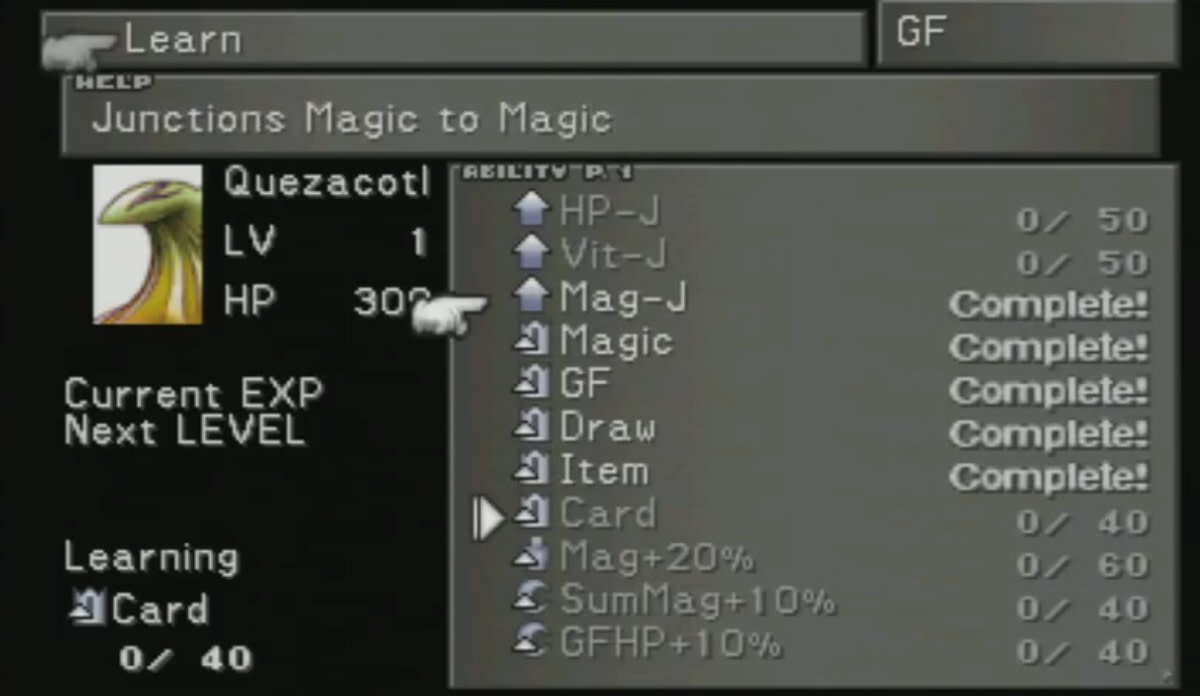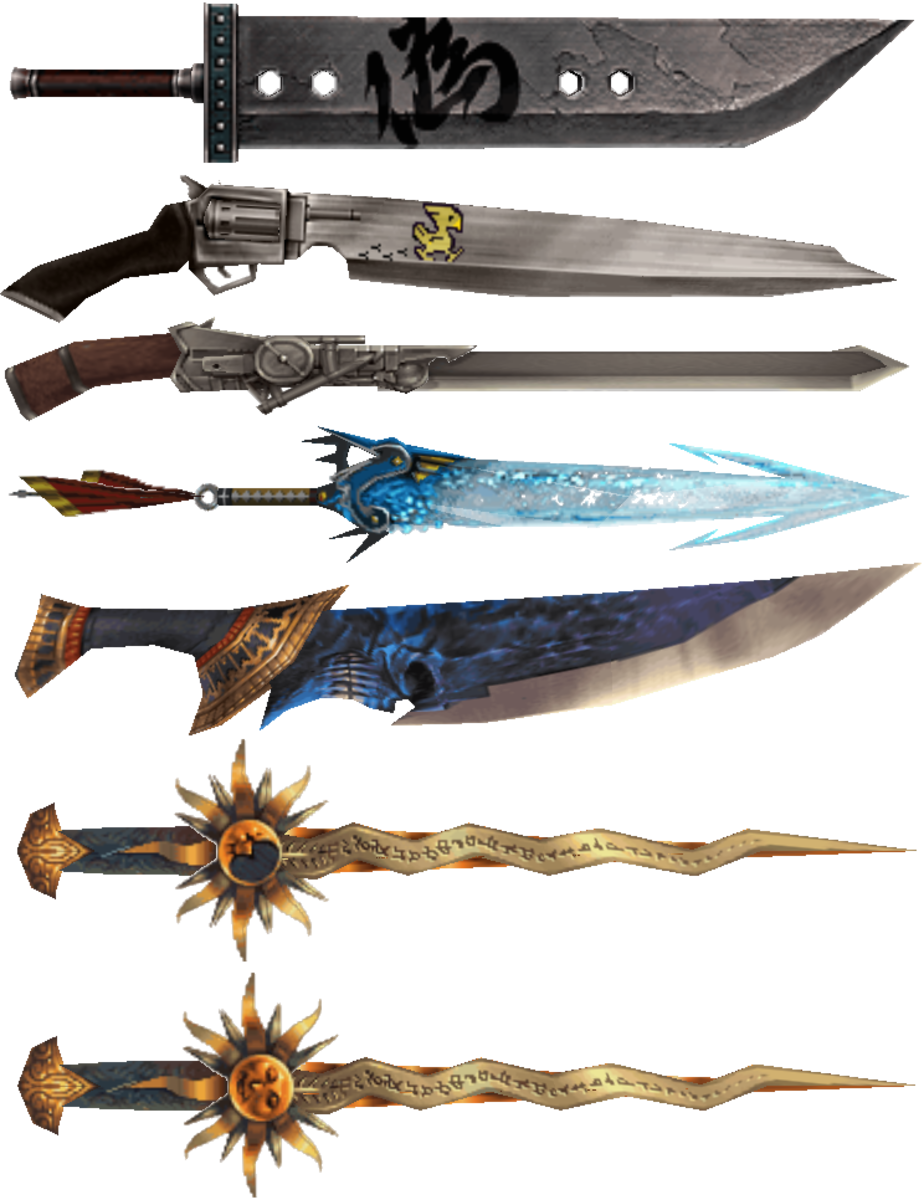- HubPages»
- Games, Toys, and Hobbies»
- Computer & Video Games»
- Roleplaying Video Games»
- Japanese Roleplaying Video Games
Review: Final Fantasy VIII
Note: This is the eighth of a multi-part series featuring reviews of Final Fantasy games.
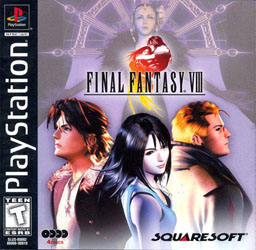
The Controversial Final Fantasy
As Final Fantasy VII was the first game in the series played by many people, Final Fantasy VIII then becomes the second such game for them. It is also a very contentious game for many people regardless of when they first played the game. Ask someone who played Final Fantasy VIII as to their opinion of the game, and they'll more than likely tell you they either love it or hate it.
I fear a lot of the disdain towards Final Fantasy VIII comes initially from the fact that, as the second Final Fantasy for many people, it was such a deviation from Final Fantasy VII that most people were put off by the changes. Even so, there are a lot of things about Final Fantasy VIII that I can understand where people would come to dislike it. Personally, I'm fine with most of Final Fantasy VIII's unique traits - though not with all of them - and while opinions of Final Fantasy VIII have improved over the years I still think the game isn't given enough credit for being the solid game that it is.

Guardian Forces and the Junction System
The biggest change comes from Final Fantasy VIII's battle system. While leveling up is still present, its diminished somewhat by the fact that enemies level up along with the player. To aid in battle, players must "junction" the game's summon creatures - known as Guardian Forces in Final Fantasy VIII - to their person. By doing so, they inherit their Guardian Force's skills and abilities for use in battle. Characters can junction multiple Guardian Forces to themselves, allowing for a lot more flexibilty.
Once a Guardian Force is junctioned, players can add commands to their battle list that each specific Guardian Force knows. At the start, the basics are available (Magic, GF, Item, Draw), but other commands are available with later GFs as well. The GF command, specifically, allows the player to summon their GFs to deal damage - if the GF has the Boost ability learned the player can mash a button when prompted to deal extra damage, though the length of some of the animations may be a put off for some.
Junctioning a Guardian Force also allows a player to junction magic to specific stats. Unlike in past games, magic in Final Fantasy VIII is consummable, up to 100 per spell for each character. Some spells are much better at boosting certain stats than other spells, but if you can get a lot of a specifically great magic (for instance, Meteor, Triple, or Holy), a character's stats are going to rise tremendously and make a lot of battles much easier than before.
As magic is consummable, one has to get magic from a source, right? Final Fantasy VIII introduces a basic method of acquiring more magic spells: by "drawing" them from enemies. Every enemy has a couple of spells that can be drawn from them for as long as a character's stock for that spell is below 100. There are also certain boss enemies in which you can draw Guardian Forces from as well (which can make those GFs missable until the end).
For many people, the junction and draw systems were far too tedious to their liking, especially when compared to battle systems of earlier Final Fantasy games. There are ways to get around drawing magic later in the game but the tedium of drawing can bog down the early portion of the game. Still, I enjoyed the junction system overall, while it is somewhat complex, and it doesn't leave much for uniqueness for the characters outside of their limit breaks, I did like the amount of customization it allows.
Final Fantasy VIII (Steam) on Amazon
The Game's Unique Quirks
The overhauled battle system isn't the only thing different about Final Fantasy VIII. Here's a few more:
- Players no longer earn money from battles, instead they are given a salary based on their decisions in the early parts of the game. They are given that salary once they hit a certain number of steps walked. If their actions throughout the rest of the game are commendable, that salary rises, otherwise the salary will drop.
- Weapons work much differently in Final Fantasy VIII. Each character's base weapon is basically now "upgradable" - requiring a set of parts needed to complete the upgrade (there is also books that detail these upgrades but I'm fairly sure they're not required to actually do the upgrade).
- Squall's gunblade can deal extra damage if the player presses a button (R1 on the PlayStation) as Squall's attack connects. Seifer's gunblade works the same (albeit with much different timing), but no other character enjoys that benefit as no other character wields a gunblade.
- Active Time Battle is back, mostly unchanged from Final Fantasy VII expect once a player calls upon a GF, their health replaces that character's until a blue bar replacing that character's ATB is depleted. If the GF loses all their health before they're summoned, they're KOed and will not appear to attack.
- Limit Breaks are back for this game. Players now must be either low on health or under the "Aura" status to trigger their limit breaks. Each character has a different ability for their limit break, and some characters require timed inputs to deal maximum damage with their Limit Breaks.
- While magic is now consummable, actually casting/using these spells in battle is mostly useless aside from Aura to set up Limit Breaks. Most offensive spells deal relatively little damage, and while curative spells are still fine, you're discouraged from using them due the nature of magic in this game and the availability of various healing potions. Using magic in this game is near Final Fantasy II levels of useless.
Those are most of the big changes for this game. Perhaps unsurprisingly, none of these features come back in later games save for timed-input Limit Breaks.
The game's soundtrack is as impressive as most Final Fantasy games, especially when it comes to the game's battle tracks. Both "The Man with the Machine Gun" (the theme used in battles featuring Laguna and his group) and "Force Your Way" (the standard boss theme) are some of the best battle themes in the series. Most of the soundtrack is similarly impressive aside from a couple of tracks - this includes, for the first time in Final Fantasy history, vocal tracks which for the most part aren't all that great albeit they play during some of the game's weaker moments.
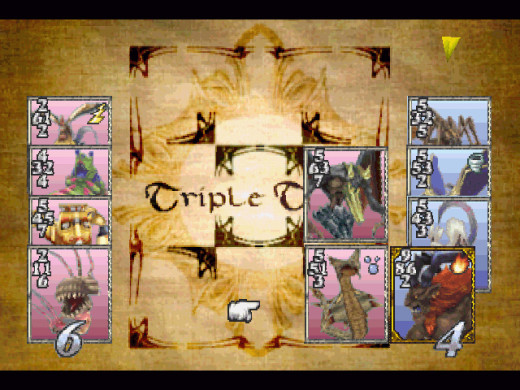
The Power of the Cards
The minigames and quick-time events found in Final Fantasy VII are back in Final Fantasy VIII but in a lesser capacity. The biggest exception to that, though, is in the card game Triple Triad. After being given a starter set of cards, a player can challenge nearly anyone else with a person's card(s) from their hand at stake. Some of the best cards (ones featuring the playable character's portraits) can be refined to make top level items when then can be refined themselves into strong magic. So, for the endgame, acquiring these cards can make all the difference.
What helps, then, is that the card game is mostly pretty fun. I won't go into details on how the game works but one feature that's included is that each area plays by a certain set of rules - including rules on how many cards are won at the battle's end - and you, the player, can spread or eliminate rules from areas as you travel. Playing with a large set of rules makes the game more complicated and difficult, but also more fun if you know what you're doing.
Chocobos are back in Final Fantasy VIII, featured in a relatively minor minigame. There are a few chocobo forests in the game you can access that each feature the minigame, and if you clear it you can then use the chocobo for that area. There is also a minigame called Chocobo World than can be played on the Japanese-only PocketStation that correlates with the chocobo minigame. Chocobo World can be played on the PC versions without the need of the PocketStation.

The Love Story for the Ages (Isn't Here)
Final Fantasy VIII isn't the first game to feature a love story. Final Fantasy IV did them, kind of, and Final Fantasy VI and Final Fantasy VII also featured romantic elements. Still, Final Fantasy VIII is the first game to really make a large portion of its story focused on the supposed love story between the main character Squall and the leading heroine, Rinoa.
What bugs me about this is the way the game goes about matching the two up. Squall is depicted as an anti-social loner who just wants to do his job and not have to deal with talking to people (which makes it rather ironic he's later designated as a battalion leader later on). As Squall and Rinoa spend time later on, the other characters catch wind of what could be happening and start actively finding ways for the two to hook up, with Squall mainly resisting those efforts. Finally, events in the game cause Squall's demeanor to completely flip around and he actively goes to Rinoa's aid, only for the other characters to bemoan Squall for leaving his responsibilities as leader to help Rinoa! Squall ends up going to space to help Rinoa, setting up a series of events that, as somewhat who doesn't really enjoy these kinds of stories to begin with, is kinda hard to sit through without cringing.
Now, I make a big emphasis on this love story, especially since it makes a big part in the game's ending, but the game's overall main plotline - a group of trained mercenaries called SeeDs who have been given the specific mission to assassinate a sorceress - is actually a pretty decent storyline... up until midway through the second disk, after everyone groups following the destruction of a nearby SeeD base, when a series of plot twists and revelations really sour the overall plot line. Ignoring the ruined character development, though, the main "defeat the sorceress" plot isn't all that bad, but its fairly minimized compared to the shoddy character development throughout the game.
Where to Play Final Fantasy VIII (Outside of Japan)
Name
| Platform
| Version
| Notes
|
|---|---|---|---|
Final Fantasy VIII
| PlayStation
| Original
| Also on PSN
|
Final Fantasy VIII
| PC (Windows)
| Original
| Original PC version from 2000
|
Final Fantasy VIII
| PC (via Steam)
| Original
| Updated version for Steam released in 2013; includes Chocobo World minigame
|
Ratings
Rating
| |
|---|---|
Gameplay
| 4/5
|
Graphics (by PS1 standards)
| 4/5
|
Audio
| 5/5
|
Plot
| 2/5
|
Replayability
| 2/5
|
Challenge
| 2/5
|
Conclusion
There are lot of things Final Fantasy VIII does that makes it a unique entry to the series. These changes are enough to put off fans both new and old. The narrative is also spotty and features poor character development. If you haven't played Final Fantasy VIII yet but would like to, you'll enjoy the game more if you focus your enjoyment in the game's battle system, though it does take awhile to become accustomed to that as well.
Its hard for me to rate this game accurately. I still had fun with the game, and the various changes to the gameplay doesn't really hinder it much besides the tedium of drawing magic. I think the game's biggest downside are its characters, and if you can't find yourself liking these characters, this game is going to be much more difficult to enjoy. Still, Final Fantasy VIII is a solid game once you look past the story, and is definitely worth a playthrough.

![Final Fantasy VIII [Online Game Code]](https://m.media-amazon.com/images/I/51do+WG9oYL._SL160_.jpg)
